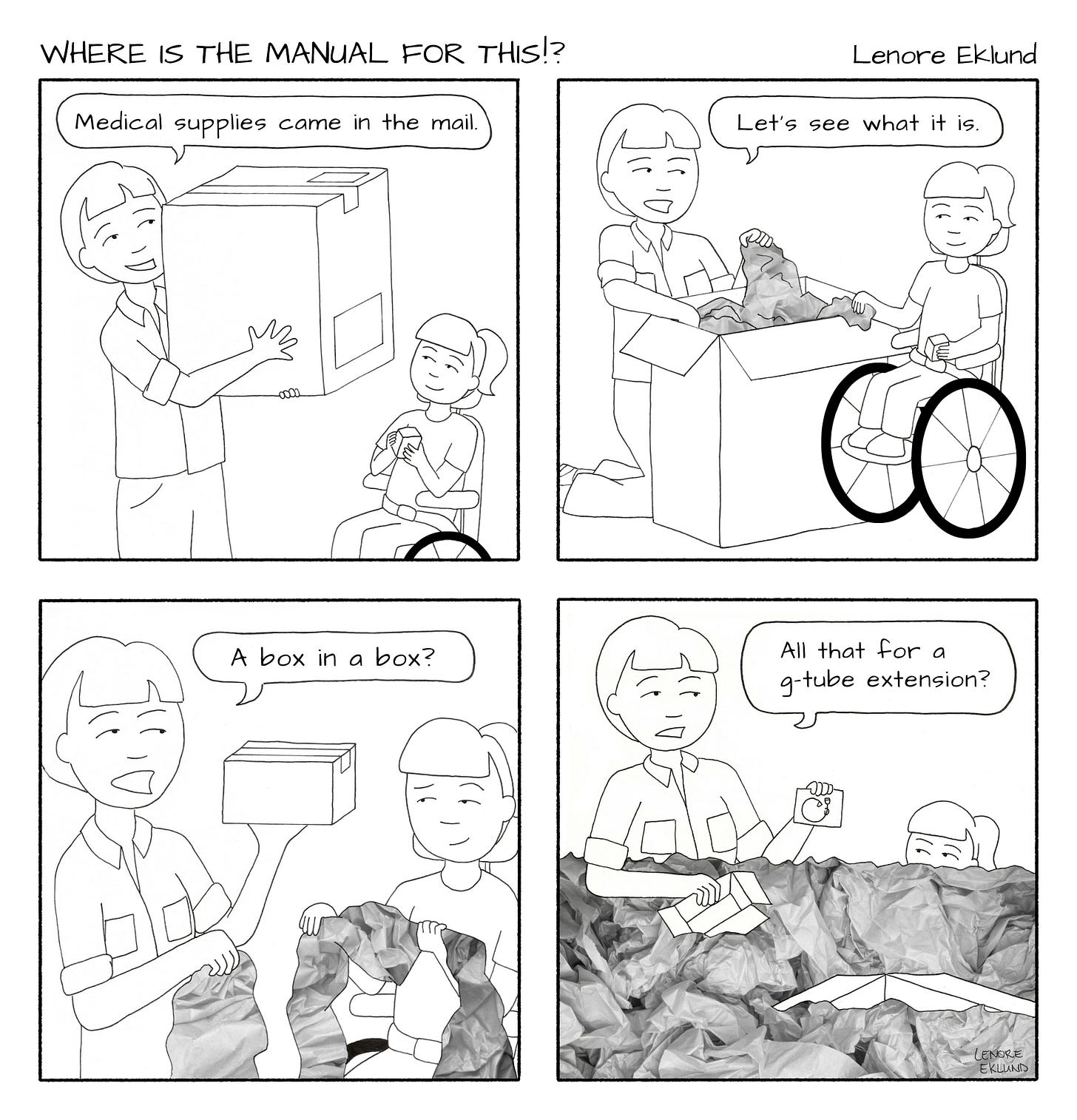On the second Sunday of every month, we feature Where is the Manual for This?!, an editorial cartoon about the medical mom life from Lenore Eklund. This one feels like an allegory for waste in the system. Have you experienced this bizarre packaging phenomenon? Comment below or write us back!
Medical Motherhood’s news round up
Snippets of news and opinion from outlets around the world. Click the links for the full story.
• From Fox 12 News (Oregon): “Parents of disabled children rally in Salem for caregiver funding bill”
On Thursday, parents of disabled children across the state gathered at the State Capitol in Salem to urge lawmakers to advance policies and funding for parents to be paid caregivers to their extremely disabled children.
“It is more than just a bill to us,” said Calli Ross. “This is truly life or death for our kids.”
It comes after hearing that Senate Bill 91, which would have made permanent a temporary program allowing parents to be paid caregivers to their disabled children permanent, would not be advancing this legislative session. Now, they are asking lawmakers to add the funding and policies to the end of session reconciliation bill along with a budget note to allow ODHS to move forward with applying for the waiver needed to establish a permanent program. […]
The temporary program started during the pandemic due to a shortage of caregivers across the country and to curb the spread of COVID-19 to vulnerable children. Several states have since made the program permanent. Ross and others say it’s been life changing for them and their kids.
[…]“We are begging legislators to listen,” said Ross. “This is way more than just politics to us. This is our children’s lives. We need something put in this session so we can resume this program before children fall off the cliff. We don’t have much time to continue on without support and right now that Oregon doesn’t want disabled children in the state. I’d like to see that change.”
Full disclosure: Calli and I work on this issue together and my kids and I were at this public demonstration.
• From WUSF Public Media (Florida): “Kids with disabilities housed in Florida nursing homes could return to families”
Children with complex disabilities who for years have been housed in nursing homes in South Florida could be able to return to live with their families as a result of a civil rights lawsuit.
The suit, filed by the Justice Department against Florida health regulators a decade ago, finally went to trial last month. It argues that the practice of institutionalizing medically fragile children in homes for the elderly violates the Americans with Disabilities Act, and seeks to push the state to create conditions which it argues would allow for families to be able to look after them at home.
[…]The trial raised concerns about Florida’s lack of private-duty nursing. That leaves many parents without an option to provide adequate in-home care, forcing them to keep their kids institutionalized.
“In one of the court files a family finally was able to get their kid out of a nursing home and the day that he was leaving, they had a goodbye party. The family got out of the home into the parking lot and they got a call saying the nurse quit before they even got the kid home,” [Carol Marbin Miller, an investigative reporter at the Miami Herald] said.
“And that is the biggest problem these families face — [it] is getting money for and then accessing in-home nursing care.”
• From The 74: “Due Process, Undue Delays: Families Trapped in NYC’s Decades-Long Special Ed Bottleneck”
[…]Special education is notoriously fraught in many school systems, but the magnitude of the problem in the nation’s largest district, New York City, boggles. The department is supposed to educate nearly a quarter of a million children with disabilities — a population that in 2019 was larger than the entire student body of all but seven U.S. school districts. In 2020-21, nearly 21% of New York City’s roughly 1 million schoolchildren received special education services, compared to a national average of 15%.
By all accounts, the Department of Education every year fails to meet even basic obligations to tens of thousands of children with disabilities. Stretching back two decades, numerous lawsuits and state audits have flagged the same problems over and over. Just this week, it was reported that 9,800 children — or close to 37% of NYC preschoolers with disabilities — did not receive all of their required services, and in March, it was revealed that 64% of bilingual special education students did not.
Because very little has changed, parents are forced — typically after years of neglect — to seek out everything from specialized instruction to intensive therapies on their own. They and their service providers are entitled to reimbursement.
[…]The “next steps” identified by the special master hint at how far from resolution those basic problems may be. The department, its report to the court suggests, should form a steering committee and appoint people to oversee “the areas of people, process and technology.”
Two pages of acronyms for various parts of the DOE bureaucracy precede 75 recommendations ranging from figuring out how to put accounts payable online so outside service providers can get paid to streamlining onerous civil service rules that complicate hiring enough people to handle the payments.
The document is in fact so complicated that Advocates for Children, which represents the plaintiffs in the 20-year-old case, translated those recommendations it agrees with into plain English and put them onto a simple chart along with suggested timelines for implementation.
The judge must now decide which recommendations to adopt, and how to hold the department accountable for progress. There is no deadline for that decision. […]
Medical Motherhood brings you quality news and information each Sunday for raising disabled and neurodivergent children. Get it delivered to your inbox each week or give a gift subscription. Subscriptions are free, with optional tiers of support. Thank you to our paid subscribers!
Follow Medical Motherhood on Facebook, Twitter, TikTok, Instagram or Pinterest. The podcast is also available in your feeds on Spotify and Apple Podcasts. Visit the Medical Motherhood merchandise store.













